Episode 8 of a series on heat pumps in existing buildings with economic considerations on operating costs
However ecologically sound a technology may be, it will only gain acceptance if it brings economic benefits to its users. The technology must pay off for the consumer. Comprehensive economic evaluation of heat pumps is a relatively complex matter and depends on a great many factors. The devices are currently costlier in terms of purchase price than, for example, gas boilers, even if the price difference varies depending on the model and quality. However, as production figures continue to rise, it can be assumed that equipment prices will fall significantly. Currently, the additional cost of the equipment is largely (or even fully) absorbed by various forms of subsidies. For the end user considering the operating costs is more important. Consequently, this blog post will focus on this aspect.
Unequal starting position
For electrically powered heat pumps, the price of electricity is a decisive factor in terms of operating costs. Just how different this price can be in terms of its composition (share of taxes and surcharges) and amount in different countries is shown in the following graphic (data source).

According to “Eurostat”, the European Union’s statistical office, electricity prices for household consumers are the highest in Germany among all the countries surveyed. Moreover, they have increased by 20% in the last 10 years. The share of taxes and surcharges in the price of electricity is particularly high in Germany. This can be explained by the fact that in Germany the energy transition costs are mainly allocated to the price of electricity and hardly at all to the prices of heating oil and natural gas. The European electricity price average is 21 cents, very close to the prices in Austria. A remarkable development can be observed in the Netherlands. Private households there pay less than half as much as in Germany. Taxes and surcharges on the price of electricity have been consistently reduced. Prices have fallen by a solid 20% in the last 10 years.
Comparison of operating costs
Besides electricity prices, several other factors are of importance when estimating the operating costs of heat pumps. It is obvious that the energy standard of the building as well as the size of the heated area are decisive for the energy demand and thus for the operating costs. In addition, the efficiency of the heat pumps is a key factor. In comparison with other heating systems, the focus is on the energy costs of this alternative energy source.
In Germany, heating oil and natural gas are currently subject to lower taxes than electricity. As a result, the price of the electricity used to operate the heat pump is almost four times higher than the price of heating oil and natural gas. This will change, however, with the new CO2 pricing that has been in effect since January 2021. It will result in a gradual increase in the cost of gas and/or heating oil. In addition, political statements made by many players indicate that the “EEG” (German Renewable Energy Act) surcharge will be significantly reduced in the next few years. This will make heat pump systems increasingly attractive from an economic viewpoint.
The following graph shows the monthly costs of houses with different energy standards (unrefurbished, partially refurbished and refurbished) equipped with a heat pump and a gas boiler. For the heat pump, both the current average heat pump tariff of 24 cents and the price of 20 cents which takes into account a significant reduction in the EEG levy – were considered. The monthly costs are shown as in relation to the efficiency of the heat pump. For the gas price, the CO2 pricing introduced by law was considered for the years 2021 and 2025, as well as an estimate for later years. For the calculation, the efficiency of the gas boiler was assumed to be 90%.
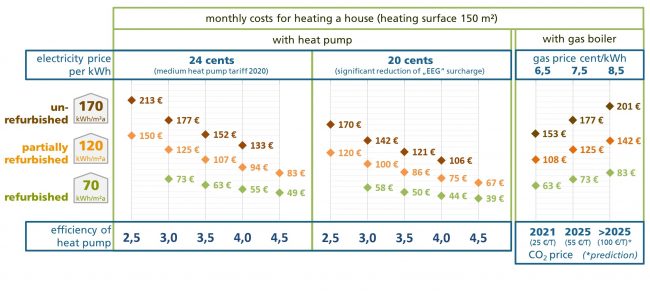
The influence of efficiency is most clearly reflected in the operating costs. For example, the monthly costs of a heat pump with an efficiency of 3.0 (e.g. for an air-to-water heat pump) are currently over €40 greater than those of a ground-source heat pump with an efficiency of 4.0 – in both cases for an unrefurbished house. For the partially refurbished house, the difference is a good €30. For the refurbished house, on the other hand, it is just under €20.
Efficiency of heat pump clearly influences operating costs
Taking into account current prices in Germany, a heat pump must achieve an efficiency of at least 3.5 in order to have roughly the same operating costs as a gas boiler. Gas prices are expected to increase by 1 cent per kWh over the next four years to 7.5 cents in 2025 due to rising CO2 costs. Consequently, a heat pump with an efficiency of 3.0 will already be comparable to a gas boiler in terms of operating costs. If gas costs continue to rise or electricity costs fall, for example due to a reduction in the EEG surcharge, heat pumps will achieve significant cost advantages. In our example, a heat pump with an efficiency of 2.5 will then be more economical than a gas heating system.
A simplified representation of the results is shown in the following graphic. For the purposes of this comparison, only the partially renovated house was taken into account.
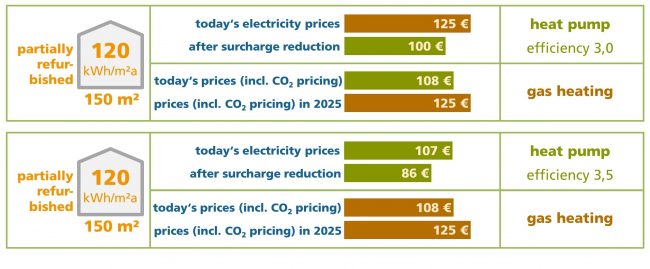
The monthly costs were calculated for a heat pump and a gas heating system respectively. In the first example, an efficiency of 3.0 was considered, and in the second, an heat pump efficiency of 3.5. The bars with the green color show the most favorable solution in each case. A heat pump with the efficiency of 3.5 already achieves economic advantages over gas heating with today’s prices.
As shown in the previous episode of the blog series, heat pumps bring clear ecological advantages over fossil-fuelled heating systems. When considering the economical aspects of operating costs, it becomes clear that lowering electricity prices in Germany is a key strategy to increase the attractiveness of heat pumps relative to fossil fuel heating systems.
By systematically reducing the tax and duty burden on electricity, the heat pump becomes the economically and ecologically preferable technology in almost all cases. According to PWC’s 2020 study “Opportunities and risks for the German Hhating industry in global competition”, “The costs of the energy transformation should therefore be shifted from electricity to heating oil and natural gas in order to take greater account of the climate compatibility of heat carriers.”
In the next installment of the series, we will look at technological developments in heat pumps. Here, the key question will be: “Shouldn’t we wait a little longer before installing them until heat pumps are really suitable for use in existing buildings?”
Further reading:
Opportunities and risks for the German heating industry in global competition. PwC-Study 2020: Huge potential of heat pumps for supplying heat to buildings https://www.pwc.de/en/energy-sector/the-german-heating-sector.html
Overview on the range of applications for heat pumps.
Episode 7 of this series: How ecological are heat pumps in existing buildings?
Episode 6 of this series: How well have heat pumps performed in practice in partially refurbished and unrefurbished buildings?
Header picture © Pixabay. This blog post is financially supported by the Climate Neutrality Foundation.

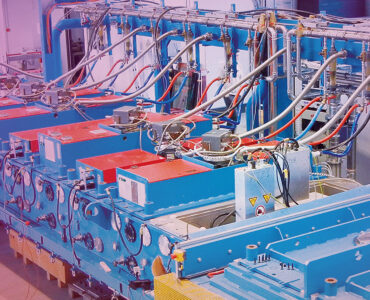

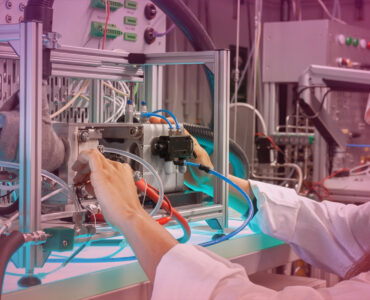



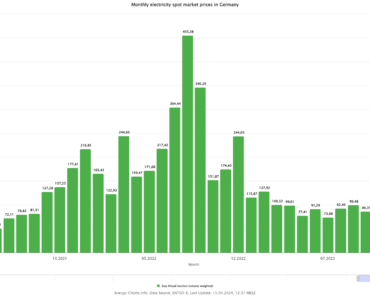
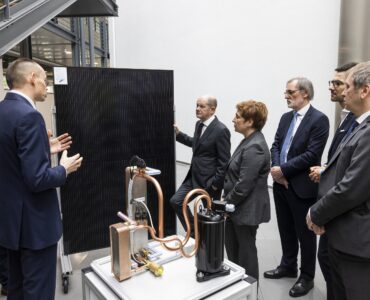





Add comment